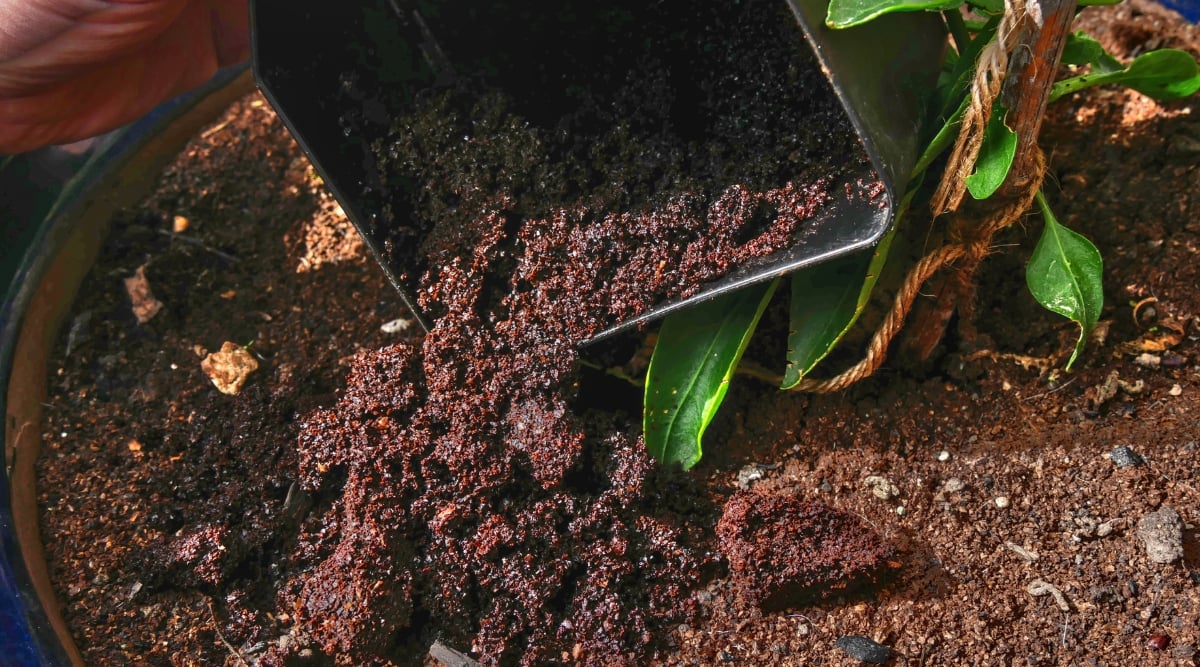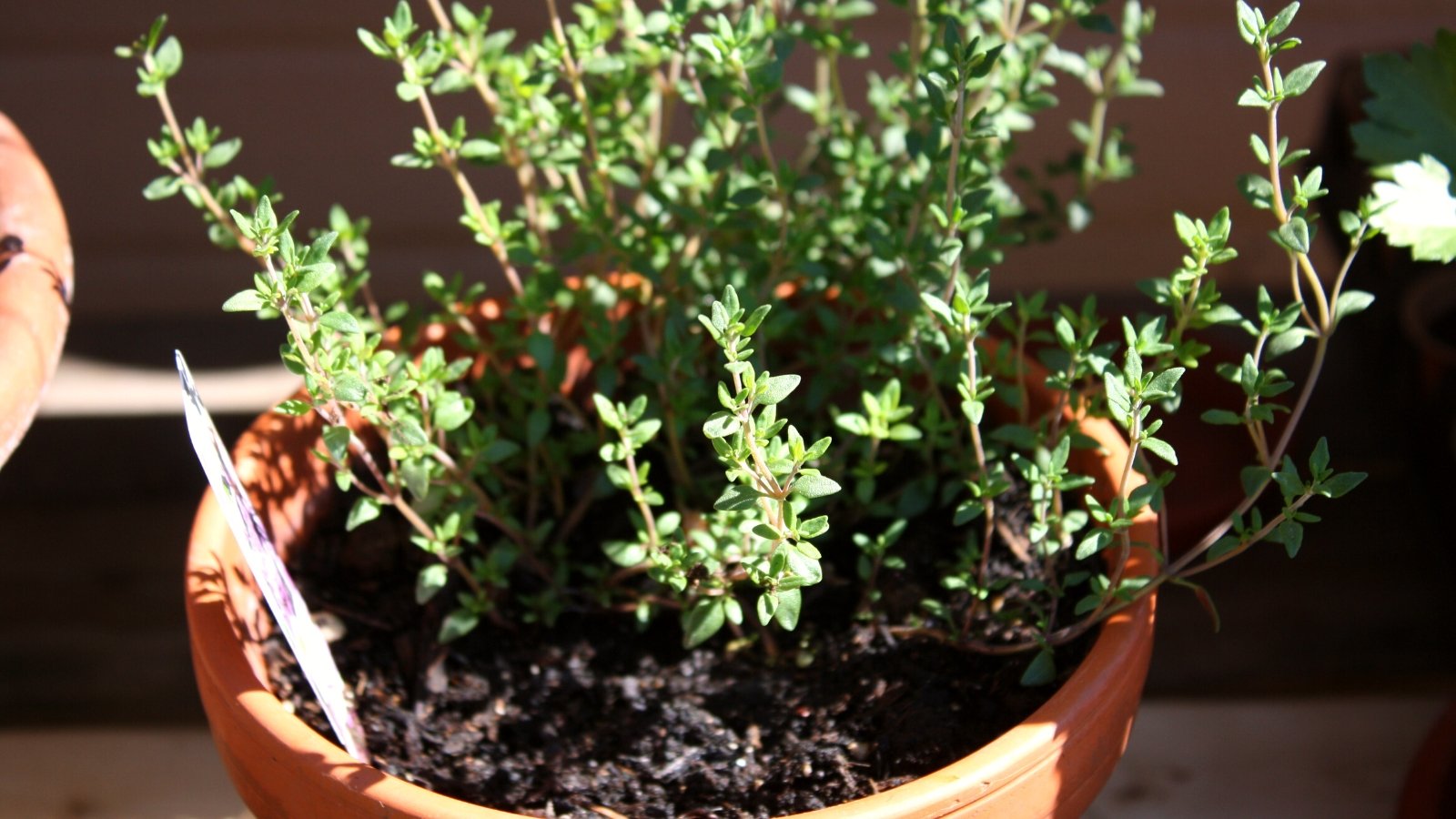Internet gardening trends may have you thinking you’ve scored heaps of free fertilizer from your daily cup o’ Joe. This well-known trick has gained so much popularity that local coffee shops have started offering their grounds for free pickup to any customers.
But before you go dumping spent coffee grounds in your garden soil, you should understand the uses (and misuses) of this unique soil amendment.
Coffee grounds can be detrimental for some plants and advantageous for others. They are also best used after composting or microbial breakdown rather than tossed raw into the garden.
Let’s dig into seven surprising ways you can use coffee grounds in your garden.
Safe Garden Uses for Coffee Grounds

Like most kitchen waste, coffee grounds have been used for centuries as a compost ingredient, mulch, and even fertilizer. Long before landfills and trash services, our coffee-drinking ancestors had to put their grounds somewhere!
These grounds are still a valuable garden resource, but modern research has given us some insights into the most effective ways to use spent coffee in your garden without risking crop health.
Mix Into Your Compost Pile

The most popular and beneficial way to use coffee grounds is to compost them. This is also the safest way to use coffee on your plants because microorganisms can break down any caffeine left over after brewing. Research shows that caffeine can suppress most plant growth, which is why we don’t recommend applying them directly to your garden soil.
Instead, treat spent grounds as a “green” material in your compost bin. They are about 2-3% nitrogen by volume and need to be balanced out by carbon-rich materials to ensure proper decomposition.
For every 1 cup of coffee grounds, add at least an equal amount of “brown” material like shredded paper or leaves. If you use biodegradable coffee filters, those count as extra carbon material!
A great ratio for a compost pile could include one-third coffee grounds, one-third leaves, and one-third grass clippings. You shouldn’t use coffee grounds for more than a third of the total volume of the pile. Don’t forget to regularly turn your compost to keep the pile aerated.
Feed Worms (Vericomposting)

Does coffee hurt worms? The jury is out on this one! While there is some evidence that concentrated coffee grounds can harm earthworms, there are also studies that show spent grounds won’t harm earthworms nor the red wiggler worms or other kinds of worms used in vermicomposting.
The key here is to ensure your coffee has been thoroughly brewed (hot water filtered through it) before applying it to plants.
After spent grounds are processed in the stomachs of worms, research shows that the spent coffee increases the nutrition of the vermicompost. Interestingly, this study found that a blend of 25% spent grounds and 75% straw pellets resulted in the greatest increase of earthworms and vermicompost biomass.
As a general rule, spent grounds should make up a maximum of 1/8th of worm bedding material. Too much could “burn” your worms’ skin and slow the vermicomposting process.
Once your worms have thoroughly broken down all the compost ingredients, it is safe to apply vermicompost throughout your garden for a nutrient-rich, microbiome-boosting amendment.
Slightly Acidify the Soil

One of the most commonly cited benefits is their ability to acidify the soil. Coffee is naturally acidic, and it seems reasonable that spent grounds could lower the soil pH for acid-loving crops.
However, the University of Arizona Extension’s research showed that spent grounds might not be as acidic as we thought. This is because the acid in coffee beans is water soluble.
After you brew your cup of Joe, spent grounds may range from 4.6 (slightly acidic) to 8.4 (fairly alkaline). The pH ultimately depends on the type of coffee, the strength of your brew, and the type of composting or microbial decomposition.
Suppress Plant Diseases

Coffee grounds have significant antibacterial and antifungal properties that have even garnered attention from the pharmaceutical industry. In the garden, they can suppress some common plant pathogens, including:
- Fungal rots caused by Sclerotinia
- Fungal wilts (Fusarium and Pythium, which commonly cause damping off disease)
- Some bacterial pathogens (E. coli and Staphylococcus)
If you have a major problem with soil-borne plant diseases, consider mixing in coffee ground compost and letting the bed stay fallow for a season before planting crops in that location again.
Environmentally-Friendly Weed Control

Thanks to its strong caffeine content and acidity, coffee grounds can be used as mulch to keep weed growth at bay. They act similarly to a “natural herbicide.” Research shows that coffee ground composts can inhibit the germination of weed seeds and reduce the need for chemical herbicides.
However, this study found that they also have allelopathic (germination-inhibiting) effects on lettuce seeds. To be safe, we recommend keeping them away from newly germinated seedling beds.
Instead, scatter grounds at least 4-6” from the base of established crop plants or in non-crop (ornamental) beds and walkways. Scrape or blend grounds into the soil surface to ensure that they don’t dry out and create a water-repellant barrier on the top layer of soil.
Deter Slugs

Slugs love cool, wet weather, but they despise sliding through the gritty, acidic texture. Anecdotal evidence from gardeners across the country insists that spent grounds keep slugs away from your crops.
You can try sprinkling and scratching the grounds into the soil surface as a “ring of protection” around slug-prone crops like strawberries or brassicas.
Soil Remediation

If you’re worried that an area of your yard or garden has been contaminated with a previous application of toxic pesticides or herbicides, coffee grounds could be a saving grace!
This major study discovered that worm-composted spent grounds could help detoxify persistent pesticides from the soil. This form of remediation could have major implications for neutralizing soils that have been polluted or heavily sprayed.
In your garden, coffee ground vermicompost could help remediate areas where plants aren’t growing due to previous contamination.
You can apply it to contaminated soil, just like compost or mulch. To be safe, we recommend only using grounds for this purpose when growing ornamental, non-edible plants. Never grow garden vegetables in soil that may be contaminated with chemicals.
When to Avoid Using Coffee Grounds
Coffee grounds are not a panacea solution to nutrient-devoid garden soils. Beware of mixing grounds into the soil before fully understanding the effects!
Avoid Applying Directly to Crops
With so much conflicting information, it is safest to compost or vermicompost your coffee grounds before applying them to the garden.
Avoid applying grounds directly into the soil of your vegetable beds, or you may risk harming your crops. This is especially important for veggies that need neutral or alkaline pH, such as tomatoes, brassicas, and lettuce.
Avoid Using Decaffeinated Coffee
Considering that caffeine causes many of the problems in the argument for using coffee grounds in the garden, you may be wondering if you should start drinking and using decaffeinated coffee. Unfortunately, this probably isn’t a good idea.
Removing caffeine from coffee beans commonly uses chemical solvents like methylene chloride or ethyl acetate. Applying decaffeinated grounds to your garden could leave residual chemicals in your garden soil.
Final Thoughts
Needless to say, using coffee grounds in the garden is nuanced and not quite as miraculous as the internet hype may have you think. Nonetheless, your spent grounds are useful when they undergo the microbial processing of compost.
When in doubt, compost first, and use them predominately on ornamental or acid-loving plants. Better yet, use them as a vermicompost ingredient for your worm farm!














